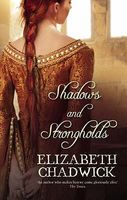 England, 1148 -- ten-year-old Brunin FitzWarin is an awkward misfit in his own family. A quiet child, he is tormented by his brothers and loathed by his powerful and autocratic grandmother. In an attempt to encourage Brunin's development, his father sends him to be fostered in the household of Joscelin de Dinan, Lord of Ludlow. Here Brunin will be educated in knightly arts.
England, 1148 -- ten-year-old Brunin FitzWarin is an awkward misfit in his own family. A quiet child, he is tormented by his brothers and loathed by his powerful and autocratic grandmother. In an attempt to encourage Brunin's development, his father sends him to be fostered in the household of Joscelin de Dinan, Lord of Ludlow. Here Brunin will be educated in knightly arts.Hawise, the youngest daughter of Lord Joscelin, soon forms a strong friendship with Brunin and they grow up together against a tumultuous background. Family loyalties mean that her father, with the young Brunin as his squire, must aid Prince Henry of Anjou in his battle with King Stephen for the English crown. Meanwhile Ludlow itself comes under threat from Joscelin's rival, Gilbert de Lacy. As the war for the crown rages, and de Lacy becomes ever more assertive in his claims for Ludlow, the relationship between Brunin and Hawise is irrevocably changed as their parents arrange a marriage between them.
As the pressure on Ludlow intensifies and a new Welsh threat emerges, Brunin must confront the future head on -- or fail on all counts ...
Comment: This was the third book by the author I've tried. Like always, she writes a great story, st in the medieval times and with a strong components of history and the ways of the time.
This is the story of Brunin, a young boy not very well treated in his house so when his father decides to ask his best friend to train Brunin in the arts of how to be a squire, Brunin goes with them but is fearful that in the new place things will be the same. As time gets by, he realizes it's nothing like his house and soon starts to be more friendly, although never losing his distrust. He meets there Hawise, the younger daughter of Joscelin, his father's best friend. During the time with Hawise's family he will learn all about honor and duty and how to protect the ones who can do it for themselves. At the same time he will get himself in the middle of the Henry's fights as he's the prince they swore allegiance to.
The book starts when Brunin is ten years old and moves forward until he's a grown up and married to Hawise, as a strategic political move made by their parents. Of course during all that time, many things happen both in their personal lives as in the world around them and nothing is as easy or uncomplicated as it looked like when they were children.
I liked the story a lot. Of course, many bad things happen, namely people we cared about dying, but in those times that happened often, because that's just how things were. I regretted seeing some of them dying because although it didn't change any plot moves, it made the main characters react and to grow up some more...but it was still sad to watch.
The political and historical things were easy enough to understand even for those who don't have a deep knowledge of that period's time of English History, but the fact it's inserted in a romance, where it isn't the main focus, helps the reader because it doesn't get too boring.
The romance was sweet, not romantic per se, but with romantic notions and hopes. What I mean is, I don't think there was that much romance to find, but they fell in love and as long as their relationship changed, so did their way of seeing things. In the end, I think it's safe to say there's a good balance among all the little parts that make this, book, the political, the romance, the fiction, the ways...
One thing bothered me, and it's not a characteristic of this book alone, much less the genre. It's really a personal pet peeve...why must the villains have so much air time, why? It really annoys me when I read a certain scene and after that there's a chapter, or a part of a chapter where we have to watch the bad guys talking or doing their nasty business? To me, it throws me of the book by making me want to avoid it or just get by it without paying much attention( my usual tactic). I know eventually the bad guys will do something, do I have to watch it? Why won't I just know about it later or why doesn't the author write a small paragraph in the end of a chapter or something saying what they're planning without giving them a voice? I know, wishful thinking but it works because I've seen it in some novels and although it might not suit the author's work or plans or whatever, to me it's dispensable.
However, the book had several emotional moments and scenes and they are worth all the parts one might dislike in there.
I liked most characters and enjoyed reading the book, although there were too many sad parts. It's the only thing, generally speaking, that puts me off more historical books set in medieval times, it's too easy to make them focus on the worse parts of those times (all the fighting, the deaths, the misery). This author actually does a great job because she doesn't delve too much on those things but they do happen and this is why I don't read the genre more often. Still, this was a great book, perfect to keep you company for as long as it takes you to read it.
This one was also a favourite with me! :-)
ReplyDelete